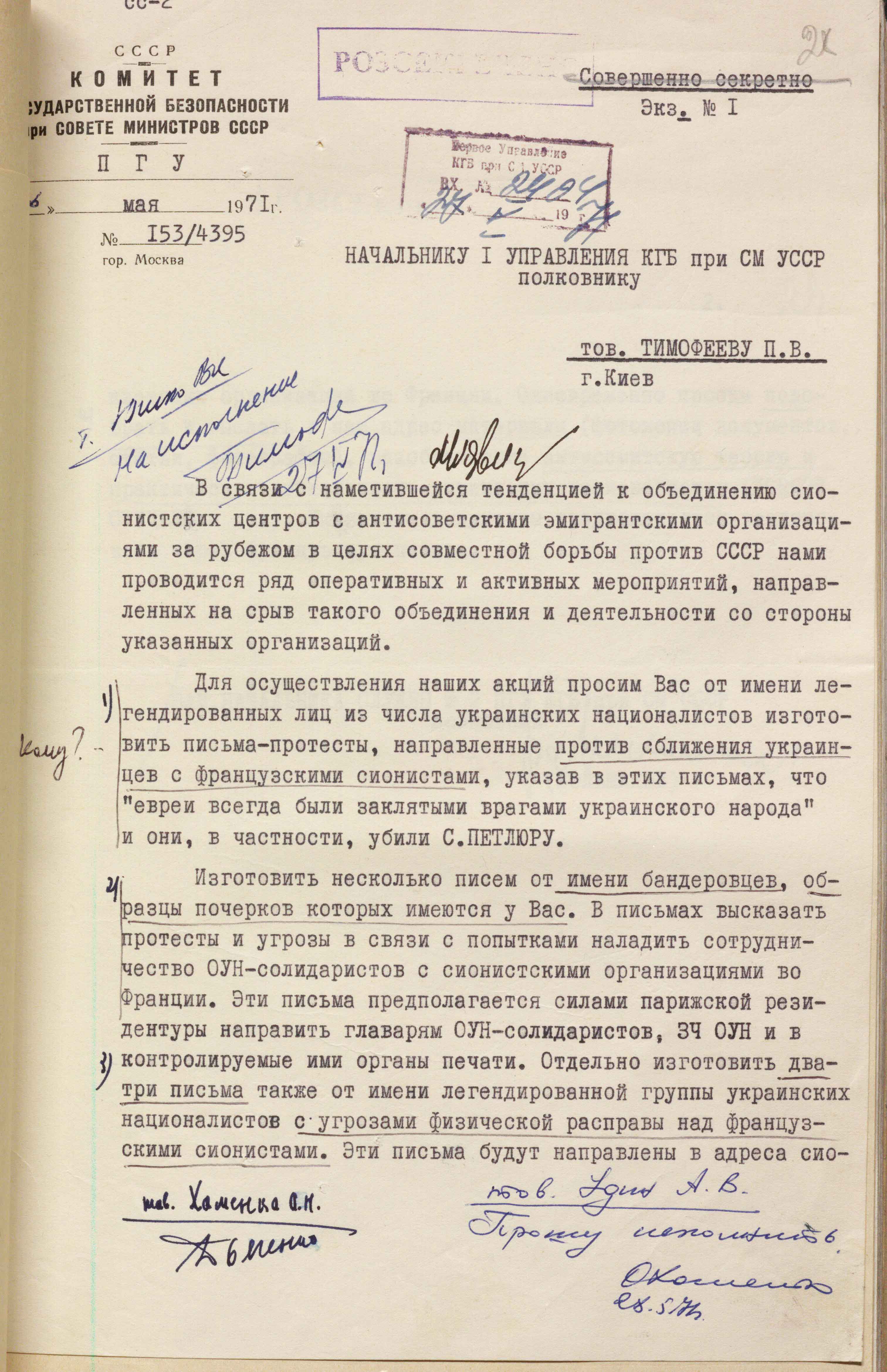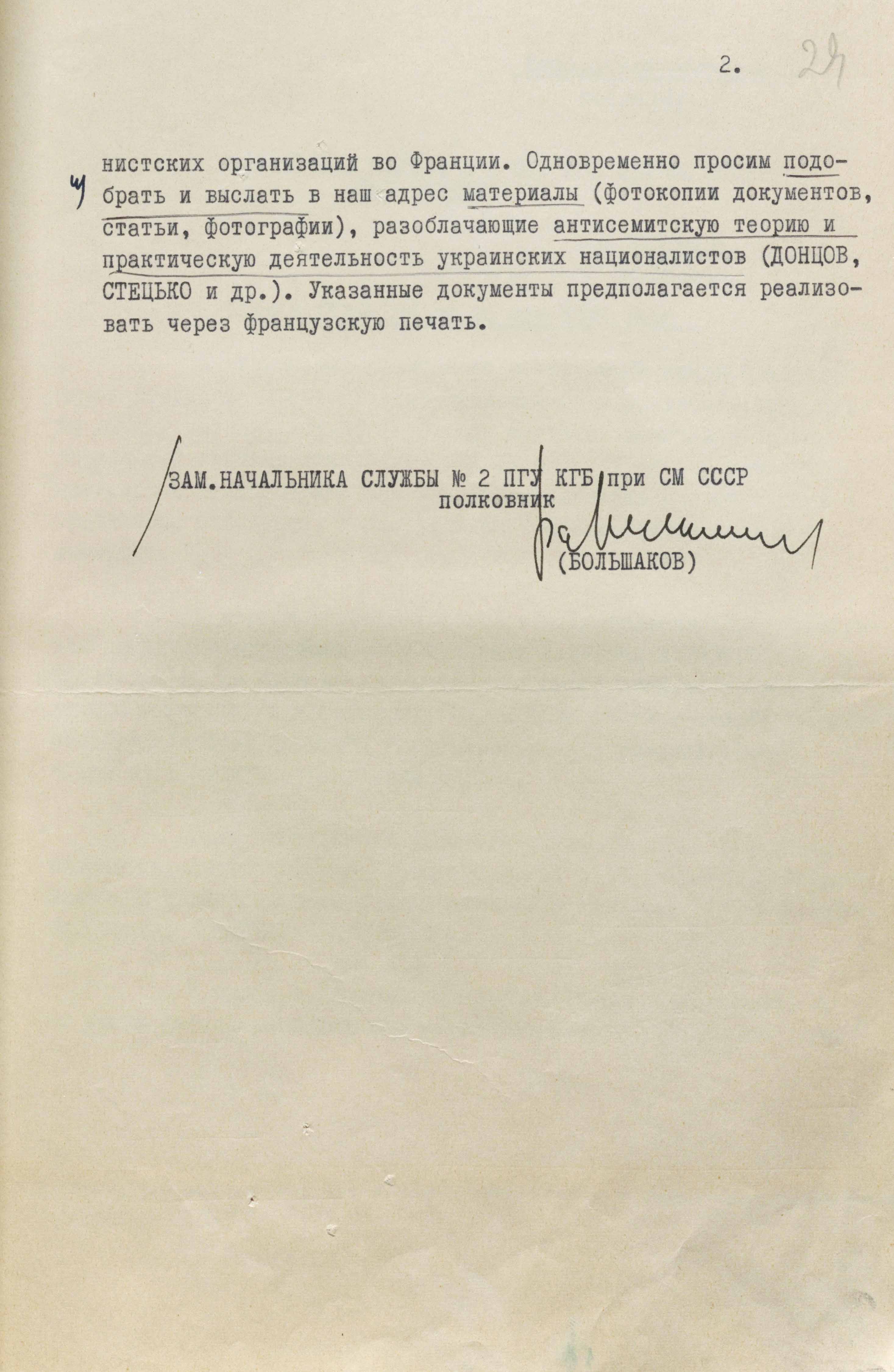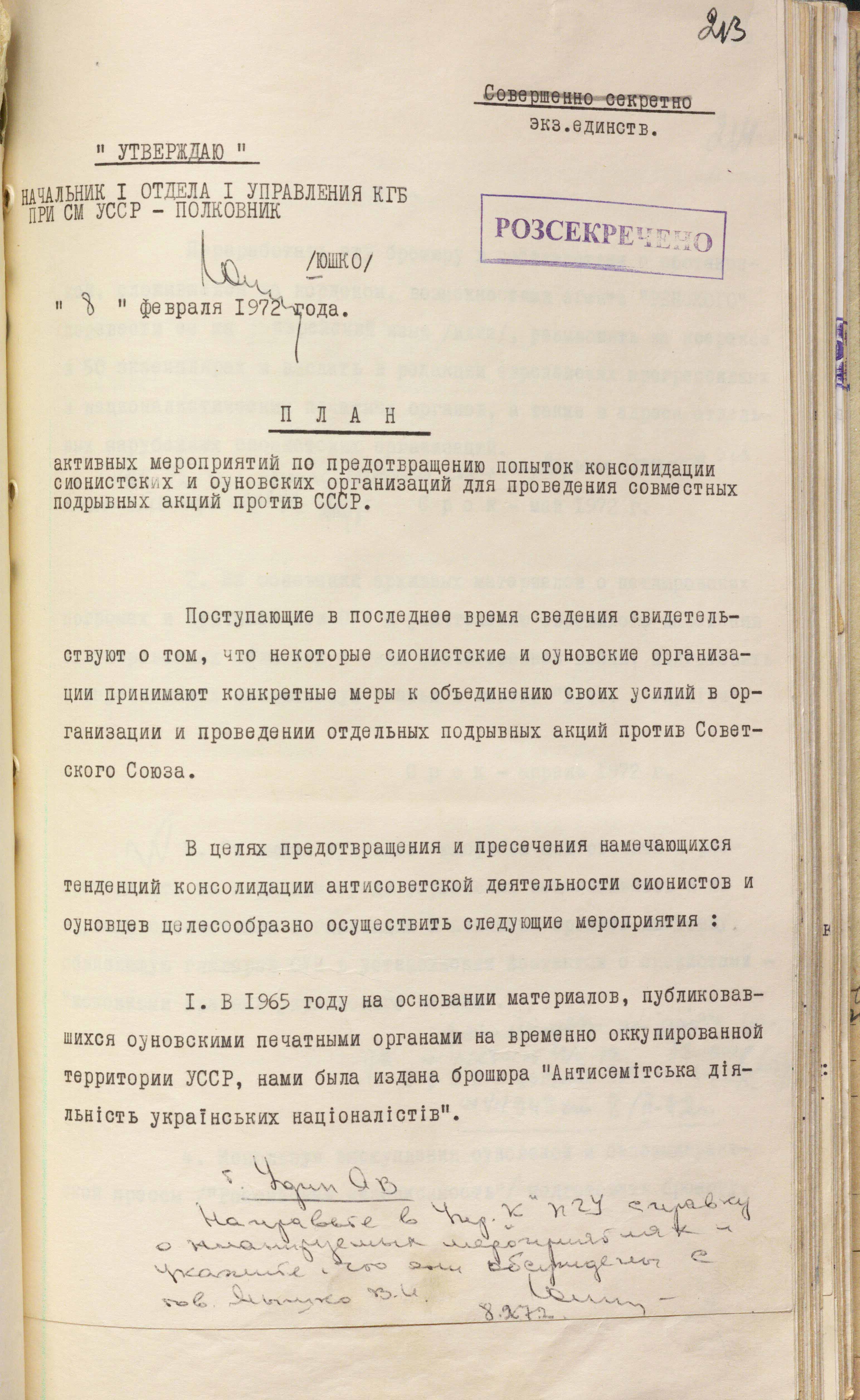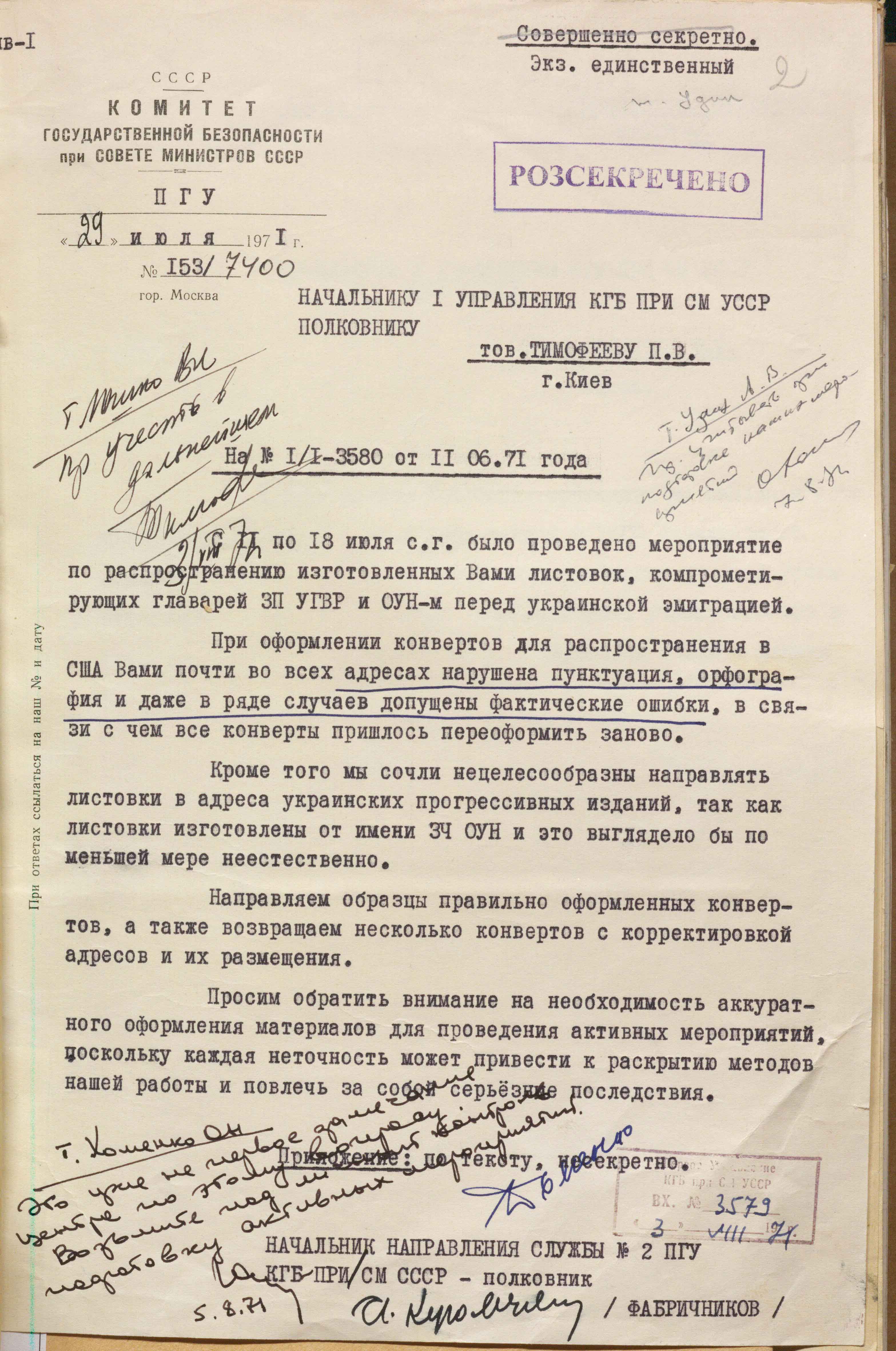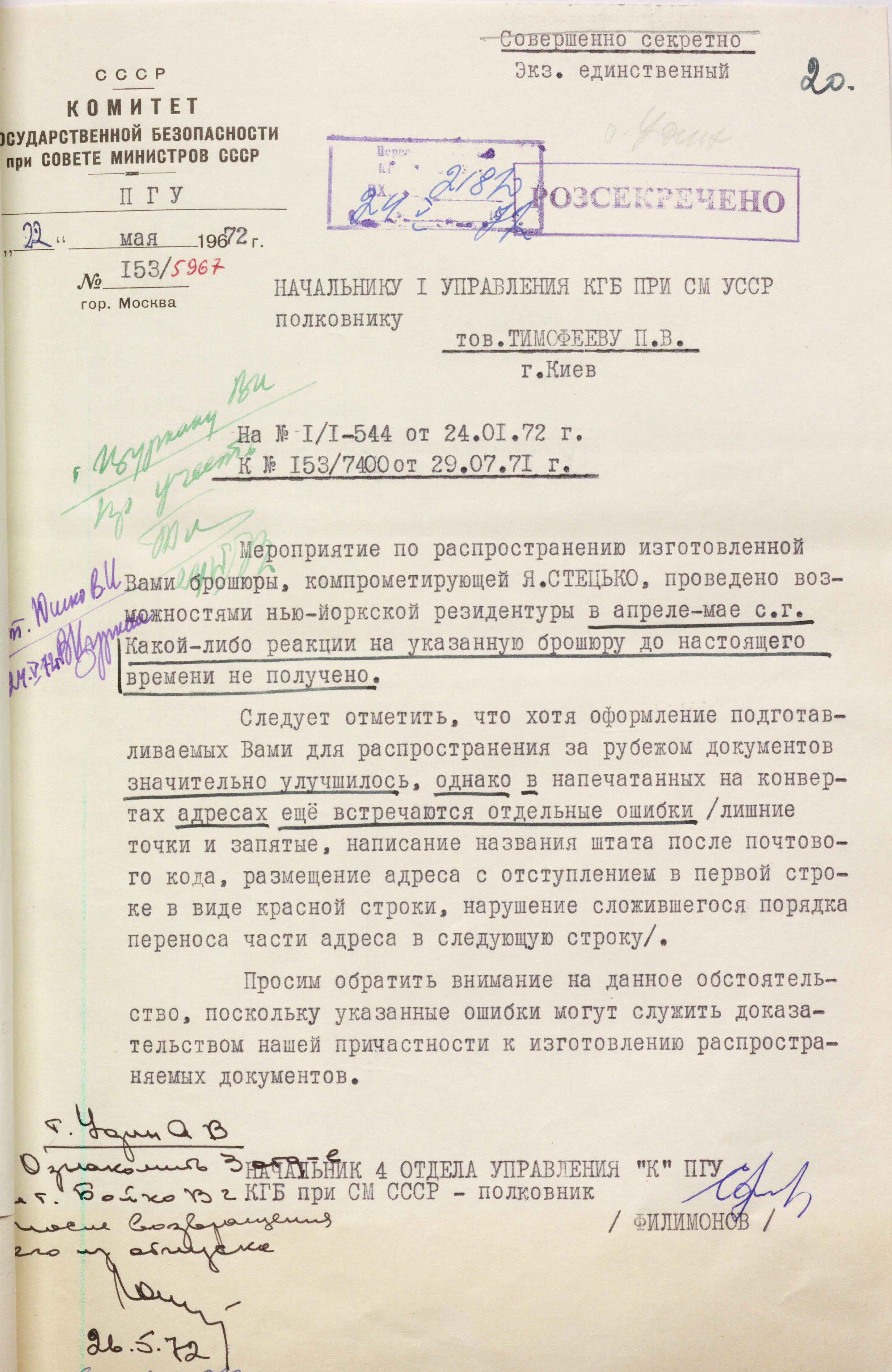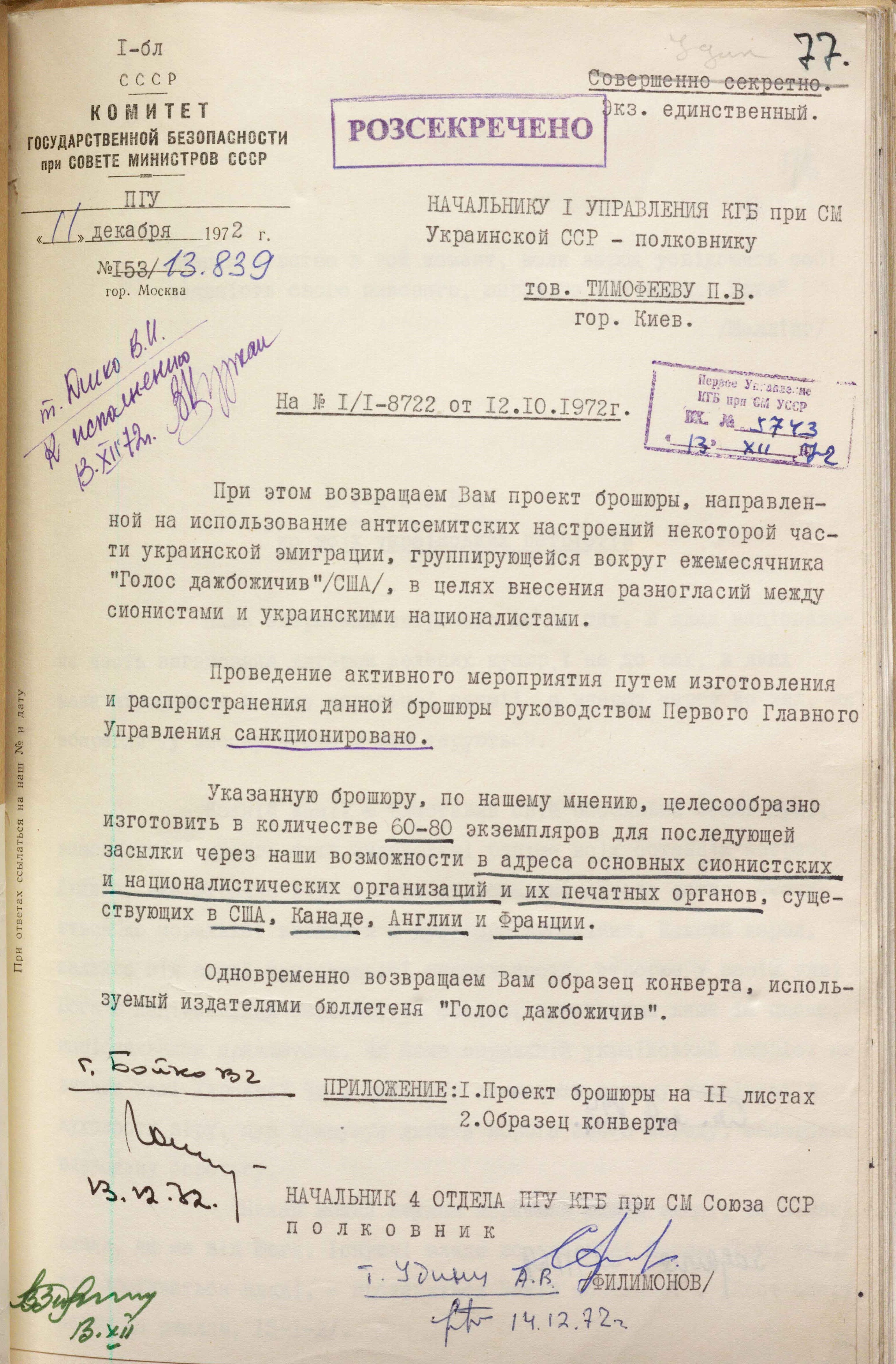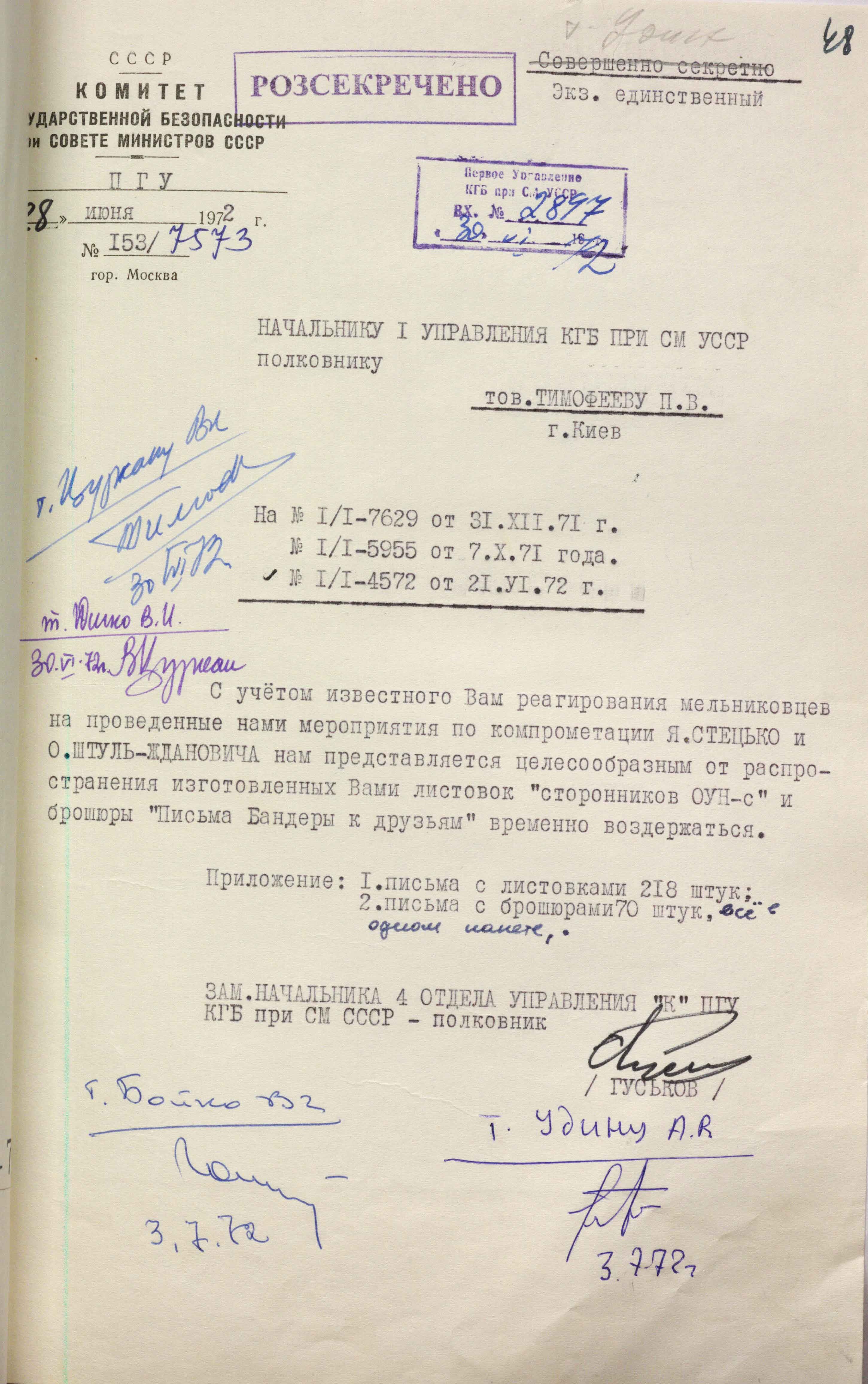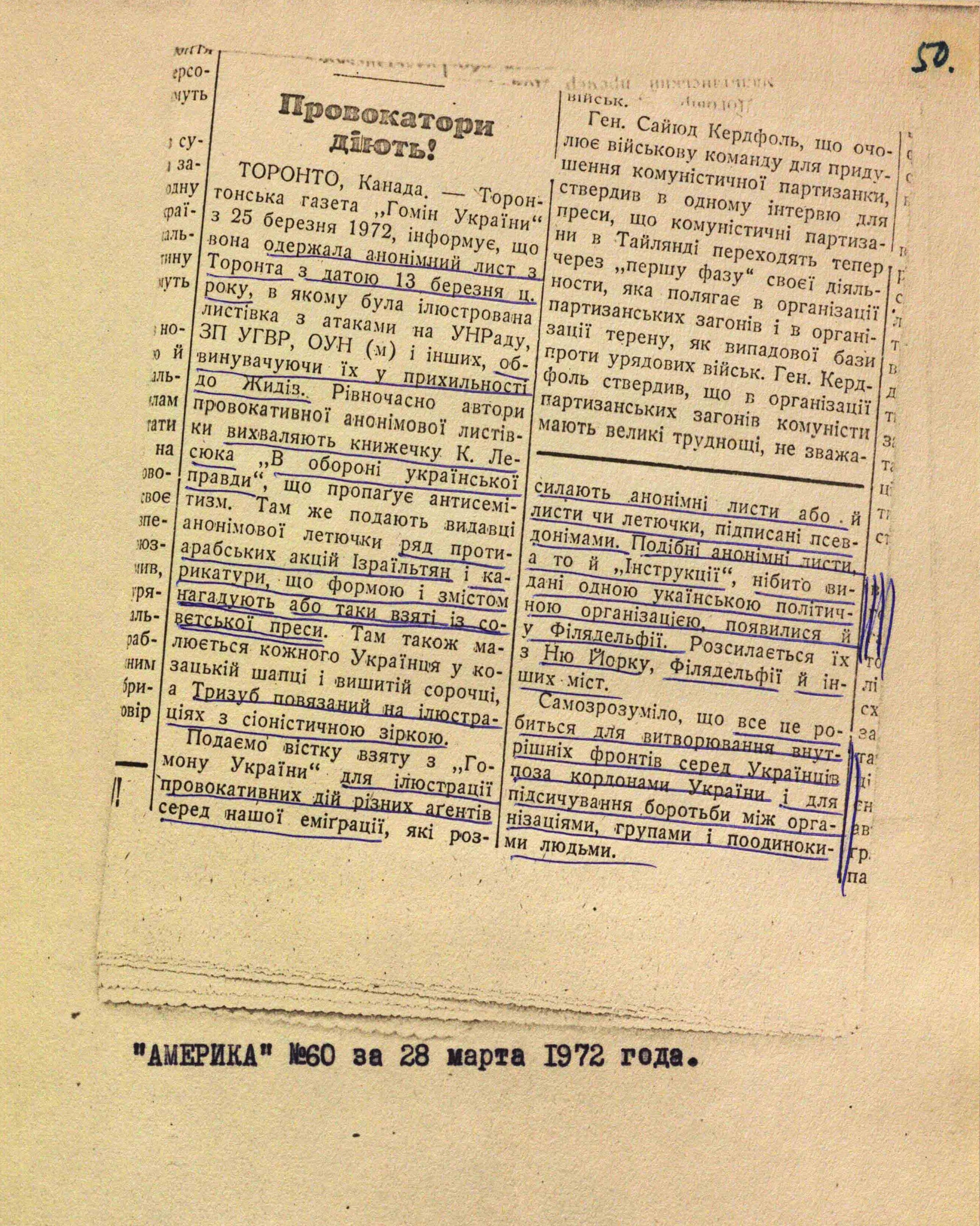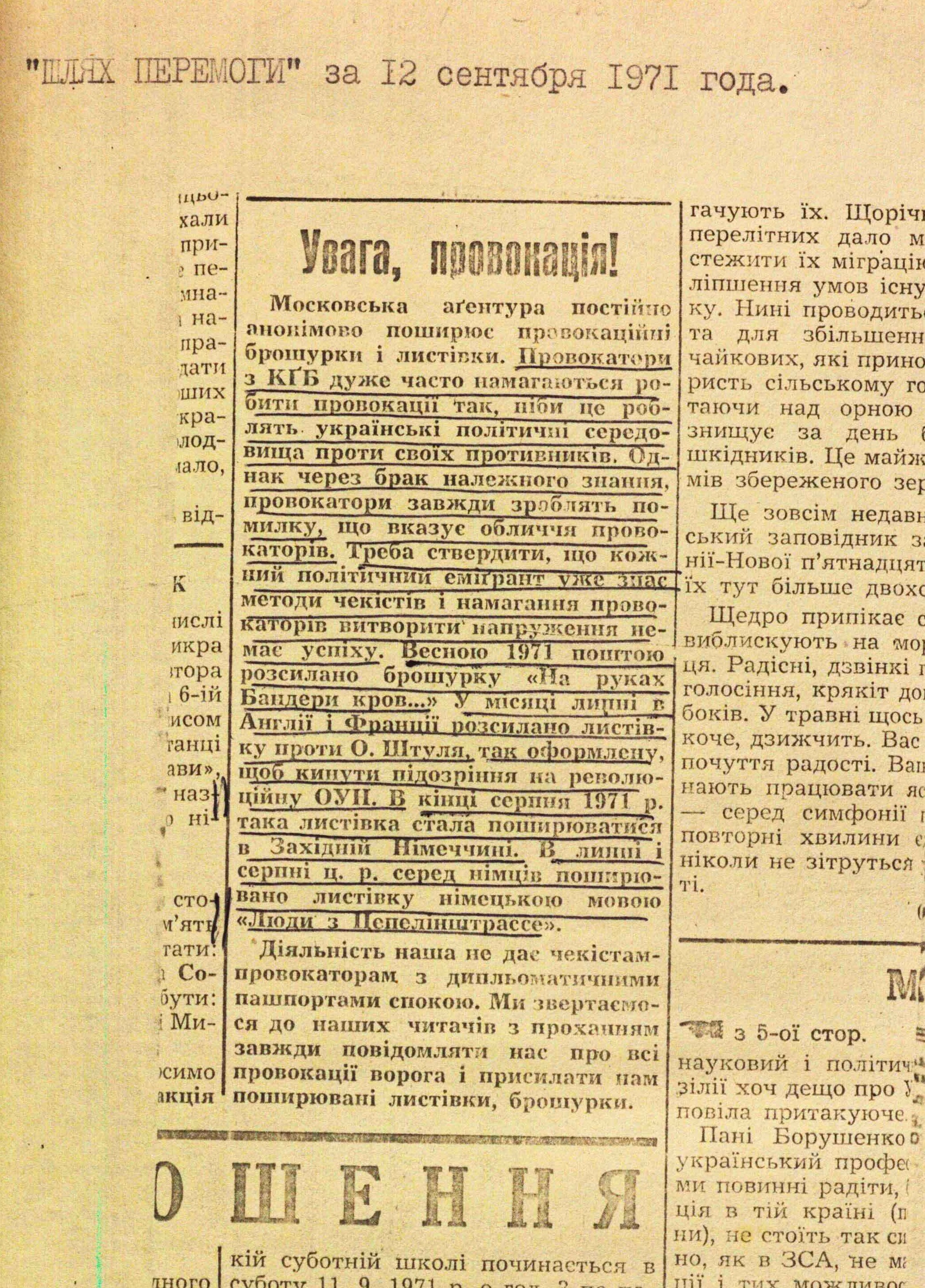Prevent the OUN from Uniting with Zionists. The kgb’s «Active measures»
10/31/2025
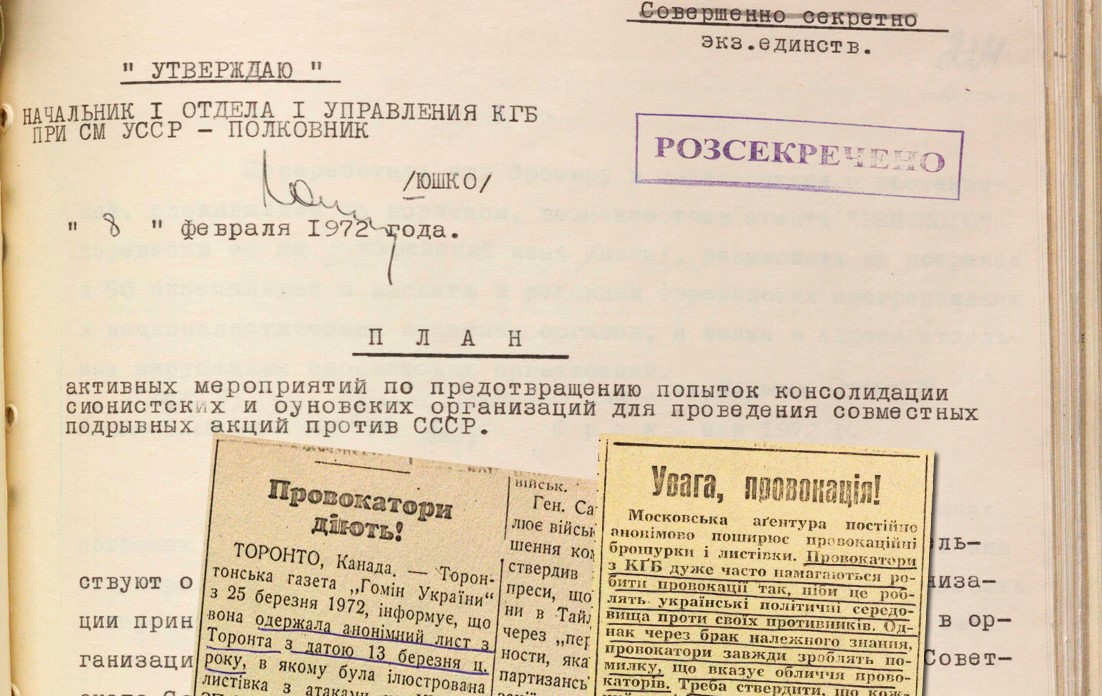
In the early 1970s, a number of documents arrived from the ussr kgb’s foreign residenturas, drawing attention to a new trend among émigré centers. It was reported that the OUN members and Zionists, despite their apparent ideological and other differences, had begun to unite in a common struggle against the policy of the ussr. Declassified documents from the archives of the Foreign Intelligence Service of Ukraine reveal how the kgb attempted to prevent such an alliance.
«Prepare Letters of Protest and Letters of Threat»
The information about the tendency of various OUN centres to team up with Zionist organizations in European countries came simultaneously from different kgb departments that specialized in fighting both «Ukrainian bourgeois nationalism” and “Jewish bourgeois nationalism». Examples were given of joint events and meetings held abroad to discuss ways of countering the policy of the ussr. Some documents even emphasized that Ukrainians and Jews got along well in emigration in daily life. And this was presented as something that supposedly should not have been happening.
«Jews in the West are friends with Ukrainians because they share many common problems,» agent «A» recounted the words of his acquaintances–members of the OUN after a trip to Munich. «In the Soviet Union, Jews are discredited, which is offensive to Ukrainians too, but ultimately it unites them. Jews now love Ukrainians and do not say anything bad about them. In Munich and other cities in Germany, Jewish merchants even sell goods to Ukrainian nationalists at reduced prices» (FISU. – F. 1. – Case 12568. – Vol. 3. – P. 16).
It would seem to be a completely normal situation. But the kgb saw this as a threatening trend. Resolutions on documents set the task to develop so-called “active measures” to prevent such an alliance. In particular, the kgb residentura in France noticed a similar picture. In response, moscow sent the following instructions to Kyiv:
«...We ask you to fabricate (from ficticious persons – allegedly Ukrainian nationalists) letters of protest against the rapprochement between Ukrainians and French Zionists, stating in these letters that «Jews have always been sworn enemies of the Ukrainian people» and that they, among other things, killed S. Petliura. Prepare several letters on behalf of Bandera’s followers, whose handwriting samples you have. In the letters, express protests and threats in connection with attempts to establish cooperation between OUN-solidarists and Zionist organizations in France. These letters are to be sent by the Paris residentura to the leaders of the OUN-solidarists, the OUN foreign units, and the print media they control. Separately, prepare two or three letters also on behalf of a ficticious group of Ukrainian nationalists with threats of reprisals against French Zionists. These letters will be sent to Zionist organizations in France» (FISU. – F. 1. – Case 12568. – Vol. 1. – P. 28–29).
In other words, it was about inciting hostility, artificially creating animosity towards one another. They understood this perfectly well, but deliberately took such steps. The kgb of the Ukrainian ssr prepared a draft of such a leaflet and sent it to moscow for approval. According to the content, it was allegedly produced by representatives of the Bandera faction of the OUN, who accused Melnyk’s followers and solidarists of rapprochеment with Jewish organizations. In addition, they proposed making a rubber stamp with the words «We have not forgotten who killed S. Petliura and where!» They planned to put this stamp at the end of each leaflet. It sounded like a veiled threat to the Jewish community.
A direct threat was to be made in letters addressed to French Jews. They were to be handwritten on behalf of OUN(b) leaders. Specifically, from those whose handwriting samples were available to the kgb residentura in Paris. In other words, these were forged letters. They also had specific addresses for delivery. In addition to individuals, the letters and leaflets were to be sent to 54 Jewish print media outlets, libraries, and organizations.
At the same time, they began to develop a project for leaflets from OUN-solidarists to Banderites. Their goal was to sow discord among them on the basis of their attitudes to the Jewish issue.
On the other hand, the kgb also planned measures supposedly as a reaction of the Jewish community to such «unfriendly» actions by OUN members. The plan was to produce leaflets, articles, and brochures accusing them of anti-Semitism. The basis for this was the well-worn theme of alleged Petliura pogroms and others. Next, they would be distributed abroad through operational capabilities. In particular, there is a mention of how this was done through an agent with the code name «Rensky». It is noted that, thanks to his extensive connections during his studies at the University of Krakow, he could send such materials for publication to the editorial offices of Jewish newspapers in Warsaw, Paris, London, New York, Toronto, and Israel.
After this plan was approved, they moved on to its implementation. However, as shown by declassified documents, they encountered certain problems.
Crash-Course for Operational Workers
«From June 11 to June 18 this year, an event was held to distribute leaflets manufactured by you, which compromised the leaders of the UHVR Foreign Units and OUN in the eyes of Ukrainian emigrants», said a document sent from moscow to Kyiv in 1972. «When preparing envelopes for distribution in the United States, you violated punctuation and spelling rules in almost all addresses, and in a number of cases, you made factual errors, which meant that all envelopes had to be redone.
Besides, we considered it inappropriate to send leaflets to the addresses of progressive Ukrainian publications, since the leaflets were made on behalf of the OUN, and this would have been odd.
We are sending samples of correctly formatted envelopes, as well as returning several envelopes with corrected addresses and their placement.
Please note the need for neat design of materials for active events, as any inaccuracy may lead to the disclosure of our methods of work and serious consequences.» (FISU. – F. 1. – Case 12568. – Vol. 1. – P. 2).
The document contains a note stating that this is «not the first remark from the center on this issue». Therefore, they began to eliminate shortcomings in order to conceal their involvement in the production of counterfeits. According to archival documents, letters were sent to kgb residenturas in the USA, Canada, and a number of European countries requesting the purchase of paper, envelopes, glue, and typewriter ribbons. This was done so that no one would have any doubts that the letters were produced abroad in a specific country, and not in the ussr. While fulfilling one of the orders, moscow reported that «unlined paper with watermarks could not be found in Washington». Instead, samples of other paper were sent so that they could decide which one would be more suitable.
But even perfectly matched paper, envelopes, and handwriting did not always save the situation. This is evidenced by a document that soon came from moscow to the kgb of the Ukrainian ssr. It stated: «It should be noted that although the design of the documents you have prepared for distribution abroad has improved significantly, there are still some errors in the addresses printed on the envelopes (extra periods and commas, writing the state name after the postal code, placing the address with an indent in the first line in the form of a paragraph, violating the established order of transferring part of the address to the next line). Please pay attention to this, as these errors may serve as evidence of our involvement in the production of the documents being distributed» (FISU. – F. 1. – Case 12568. – Vol. 2. – P. 20).
Despite its shortcomings, this work was not stopped. According to a 1972 report by the kgb of the Ukrainian ssr, «in order to stir up hostility between the Foreign Units of the OUN and Foreign Units of the UHVR, and to prevent the consolidation of OUN members with Zionists and other anti-soviet organizations, one brochure, four leaflets, and three letters were distributed abroad, and 24 articles, including four in English, were published in the republican press and in the newspaper «Visti z Ukrainy» (FISU. – F.1. – Case 12568. – Vol. 3. – P. 110–111).
But quantity did not mean quality.
«Attention! Provocation!»
During that period, the kgb carried out a series of so-called active measures against leading figures of the Ukrainian emigration. In particular, in order to disrupt the activities of the Ukrainian Revolutionary Democratic Party and its relations with other figures of the Ukrainian emigration, a campaign had been carried out earlier against the leader of the URDP, Ivan Bahrianyi. According to archival documents, a series of forgeries prepared by the kgb added distorted information to the real facts of his biography, which was intended to compromise him both in the eyes of members of other Ukrainian parties and in the eyes of his fellow party members. One of the leaflets was specially printed on Canadian-made paper on a rotary press to give the impression that it was the work of his party members in Canada.
The same tactics was used against Oleh Shtul-Zhdanovych, the leader of the Melnyk wing of the OUN. By forging his letters to his father, mixing half-truths and outright lies with real information, moscow cast a shadow on him, spreading rumors about his alleged cooperation with the soviet state security agencies, thereby seeking to sow distrust and discord among his associates.
Another «active measure» by the kgb, aimed at causing a moral trauma to leader of the OUN Yaroslav Stetsko, was given the code name «Nekro». The essence of the operation was to spread a fake obituary, on the one hand, to cause a deterioration in the health of the seriously ill leader of the Organization, which could lead to his death, and on the other hand, to achieve a split among the leadership and an unhealthy struggle for the post of the OUN leader.
In order to divert suspicion from the real perpetrators, a multi-step plan was developed. According to the plan, fabricated evidence was published in one of the periodicals through a foreign agent, claiming that the «obituary» had been distributed by radio station employees of Jewish nationality. They allegedly did this in retaliation for repeated reproaches from Bandera supporters and demands to expel them from the radio station. To support this version, a copy of a letter written in the kgb in the handwriting of the dissident M. Fleishman, who had left the ussr, was distributed along with the «obituary». In a letter to an acquaintance who worked at Radio Liberty, he allegedly requested that forms from the radio station be obtained and sent to the United States, which would «contribute to increased hostility, mutual suspicion, and distrust among the radio station’s employees».
Eventually, the role of the kgb in those operations was exposed. The same happened in the situation with the creation of artificial confrontation between OUN and Jewish organizations. This is indicated by a number of publications in the émigré press, which are included in the archive files. In particular, the newspaper «Shliakh Peremohy», on September 12, 1971, published an article under the headline «Attention! Provocation!» It read as follows:
«moscow agents constantly distribute provocative brochures and leaflets anonymously. kgb provocateurs often try to make provocations look as if they were carried out by Ukrainian political circles against their opponents. However, due to a lack of proper knowledge, provocateurs always make mistakes that reveal their identities. It should be noted that every political emigrant is already familiar with the methods of the chekists, and the provocateurs’ attempts to create tension are unsuccessful. In the spring of 1971, a pamphlet entitled «Bandera Has Blood on His Hands...» was distributed. In July, a leaflet against O. Shtul was distributed in England and France, designed to cast suspicion on the revolutionary OUN... Our activities make the chekist provocateurs with diplomatic passports restless. We ask our readers to always inform us of all enemy provocations and to send us the leaflets and brochures that are being distributed. (FISU. – F. 1. – Case 12568. – Vol. 2. – P. 61).
On March 25, 1971, the newspaper «Homin Ukrainy» published a report entitled «Another Bolshevik Provocation». It stated that the editorial office in Toronto had received an anonymous letter and a leaflet. The text accused OUN activists Mykola Lebed and Oleh Shtul-Zhdanovych of having contacts with Jewish organizations. The editorial office unequivocally identified the authors of this message as kgb employees who intended to «create internal fronts among Ukrainians outside Ukraine».
The report read as follows: «Please, pay attention to the latest provocations by soviet agents also because the kgb is transferring its anti-Semitic practices to areas outside the ussr and will try to divide Ukrainian society outside Ukraine along the lines of Semitophiles and anti-Semites.» (FISU – F. 1. – Case 12568. – Vol. 2. – P. 3).
Thanks to such explanations from Ukrainian publications, it was possible to mitigate the negative impact of such special operations. In turn, under pressure from such demasking, the kgb had to retreat, at least for a certain period of time. This is evidenced by a message from moscow to the kgb of the Ukrainian ssr dated June 28, 1972. It stated: «Taking into consideration the reaction of Melnyk’s supporters to our actions to compromise Y. Stetsko and O. Shtul-Zhdanovych, we consider it advisable to temporarily refrain from distributing the «OUN supporters»’ leaflets you have manufactured, and the brochure «Bandera’s Letters to Friends» (FISU. – F. 1. – Case 12568. – Vol. 2. – P. 48).
But these were only temporary tactical pauses. In general, the kremlin leadership and its special services never reduced their efforts to weaken and divide émigré organizations, to sow discord among them, to sow enmity on national or religious grounds, to discredit leaders or individual activists, to provoke the negative attitude of the governments and populations of various countries to Ukrainian or other emigrants.
